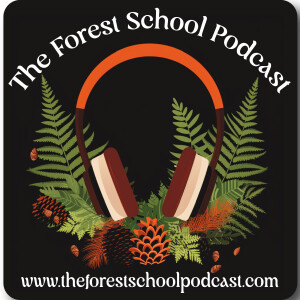Support The Forest School Podcast on Patreon for bonus episodes and ad-free episodes at
www.patreon.com/theforestschoolpodcast 🌲🎧.
Find out about our sessions and Forest School Leader Training in Devon, UK at www.children-of-the-forest.com
—
Guest Info:
https://tideview.com/
—
Sponsors:Visit HelloFresh to get 60% off your 1st box + 25% off for 2 months + free gifts!
Sign up with Skillshare for 30% off annual membershipProtect your computer with Nord VPN
---
Summary
Jesse Zhao discusses the blending of Reggio, and Forest School philosophies for early childhood education. She explains the differences between the Chinese and Canadian approaches to early years education. The Reggio approach is characterized by its guiding principles, including the image of the child, the 100 languages of the child, and the role of the teacher. The environment is considered the third teacher in Reggio, and it is prepared to provide opportunities for children to explore. The focus is on process over product, and education is seen as encompassing various aspects of learning and development. Collaborative partnerships with families and the wider community are also emphasized in Reggio-inspired education. In this conversation, Lewis and Jessie discuss the principles and practices of Reggio Emilia and Forest School approaches to education. They highlight the importance of reciprocal relationships and collaboration in creating a positive learning environment. They also explore the challenges of preparing children for formal education and the role of respect for the environment in both pedagogies. The conversation touches on the balance between intrinsic motivation and tidying up, as well as the challenges of implementing Forest School full-time. Jessie shares her experience setting up Tideview Nature School, a part-time Forest School program for children under five.
Takeaways
The Reggio approach to early childhood education is influenced by the image of the child, the 100 languages of the child, and the role of the teacher.
The environment is considered the third teacher in Reggio, and it is prepared to provide opportunities for children to explore.
Reggio emphasizes process over product, focusing on the learning and development that occurs throughout the journey.
Collaborative partnerships with families and the wider community are important in Reggio-inspired education. Reciprocal relationships and collaboration are key principles in both Reggio Emilia and Forest School approaches.
Creating a positive learning environment involves involving parents, educators, and the community.
Preparing children for formal education requires a balance between autonomy and structure.
Respect for the environment is emphasized in both pedagogies, with a focus on natural materials and sustainable practices.
Chapters
00:00 Introduction and Background
01:14 Overview of Reggio and Forest School
04:34 Reggio Approach: Guiding Principles
06:18 Importance of the Environment in Reggio
07:04 Preparing the Environment in Reggio
09:08 Provocations and Invitations in Reggio
11:22 Process over Product in Reggio
13:05 Education and Learning in Reggio
15:11 Regulating and Social-Emotional Development
21:51 Involving Families and the Community
22:56 The Importance of Reciprocal Relationships
24:09 Creating a Collaborative Learning Environment
25:09 Preparing Children for Formal Education
28:35 Respect for the Environment
30:17 Balancing Intrinsic Motivation and Tidying Up
36:36 Challenges of Implementing Forest School Full-Time
41:20 Setting Up Tideview Nature School
More Episodes
The Vagus Nerve and Polyvagul Theory
 2021-07-02
2021-07-02
The 'Low Arousal Approach' for learners
 2021-06-13
2021-06-13
Book Review - Primitive Technology by John Plant
 2021-05-22
2021-05-22
The Play Cycle: Theory, Research and Application by Pete King and Gordon Sturrock
 2021-05-08
2021-05-08
Maintaining a Work/Life Balance
 2021-05-02
2021-05-02
John Dewey’s “Experience and Education”
 2021-04-16
2021-04-16
Woodworking at Forest School
 2021-04-04
2021-04-04
The Declarative Language Handbook - Book Review
 2021-03-26
2021-03-26
Braiding Sweetgrass - Book Review
 2021-03-12
2021-03-12
Foraging with Lea and James from Woodland Classroom
 2021-02-25
2021-02-25
Forest School in Catalonia w/ Vicky Mateu
 2021-02-18
2021-02-18
Act now on the government's plan on young people's mental health!!
 2021-02-10
2021-02-10
What best explains children’s connection with nature? by Miles Richardson
 2021-02-07
2021-02-07
Forest School Maths!
 2021-01-23
2021-01-23
If a child learns in the forest, and there are no adults there to see it, did they really learn at all?
 2021-01-16
2021-01-16
Winterising our site & 'Yearly Theme' setting
 2021-01-09
2021-01-09
2021 New Years Quiz!
 2021-01-02
2021-01-02
Rituals and Magic w/Jenny Archard
 2020-12-20
2020-12-20
Vaguely Talking about Professional Responsibilities
 2020-12-12
2020-12-12
The Explosive Child by Dr Ross W Greene
 2020-11-22
2020-11-22
Create your
podcast in
minutes
- Full-featured podcast site
- Unlimited storage and bandwidth
- Comprehensive podcast stats
- Distribute to Apple Podcasts, Spotify, and more
- Make money with your podcast
It is Free
You may also like

Mayo Clinic Talks


The Saad Truth with Dr. Saad


Positive Thinking Mind


ŒIL pour YEUX, DENT pour MÂCHOIRE 😎


The Jordan B. Peterson Podcast


- Privacy Policy
- Cookie Policy
- Terms of Use
- Consent Preferences
- Copyright © 2015-2024 Podbean.com



 iOS
iOS Android
Android